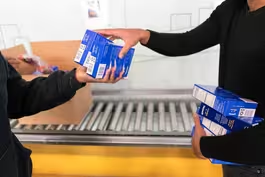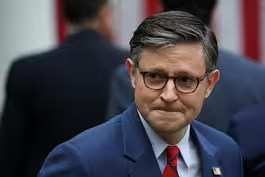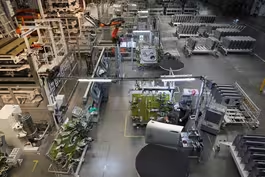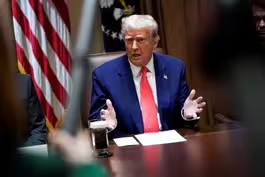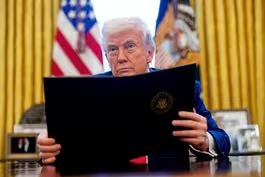
Senegal struggles with climate despite promises of help
Clip: 4/10/2025 | 8m 37sVideo has Closed Captions
Senegal struggles to cope with climate change despite promises of help from other nations
In 2009, a group of wealthy nations committed to helping less developed countries cope with the effects of climate change. But where the $100 billion goes has been tough to verify and critics say the effort has done little to help the people who need it most. With support from the Pulitzer Center, Fred de Sam Lazaro reports on efforts to combat climate change and alleviate poverty in Senegal.
Problems playing video? | Closed Captioning Feedback
Problems playing video? | Closed Captioning Feedback
Major corporate funding for the PBS News Hour is provided by BDO, BNSF, Consumer Cellular, American Cruise Lines, and Raymond James. Funding for the PBS NewsHour Weekend is provided by...

Senegal struggles with climate despite promises of help
Clip: 4/10/2025 | 8m 37sVideo has Closed Captions
In 2009, a group of wealthy nations committed to helping less developed countries cope with the effects of climate change. But where the $100 billion goes has been tough to verify and critics say the effort has done little to help the people who need it most. With support from the Pulitzer Center, Fred de Sam Lazaro reports on efforts to combat climate change and alleviate poverty in Senegal.
Problems playing video? | Closed Captioning Feedback
How to Watch PBS News Hour
PBS News Hour is available to stream on pbs.org and the free PBS App, available on iPhone, Apple TV, Android TV, Android smartphones, Amazon Fire TV, Amazon Fire Tablet, Roku, Samsung Smart TV, and Vizio.
Providing Support for PBS.org
Learn Moreabout PBS online sponsorshipAMNA NAWAZ: In 2009, a group of wealthy nations made a commitment collectively to help less developed countries cope with the effects of climate change.
But where the $100 billion in annual grant pledges actually go has been tough to verify.
And critics say that the effort has done little to help the people who need it most.
With support from the Pulitzer Center, Fred de Sam Lazaro traveled to Senegal to report on efforts to combat climate change and alleviate poverty.
FRED DE SAM LAZARO: Fisherman Ibrahim Diagne remembers playing soccer on the beach here, beach that is now the Atlantic Ocean.
He points to a stretch of boulders on the shoreline, a last line of defense to save properties from being swallowed by a warming, rising sea.
So that one closed, right?
It's not safe out there.
Many buildings that were once homes, hotels, and eateries are now abandoned, and, beyond the boulders, a more vivid glimpse of the erosion.
There is one short stretch where the raging Atlantic has been tamed.
THIOBANE GUISSE, General Manager, Beach Resort and Spa (through translator): Today, things are going very well.
FRED DE SAM LAZARO: Thiobane Guisse is general manager of the Palm Beach Resort and Spa in an area that attracts many mostly French tourists in this former French colony.
THIOBANE GUISSE (through translator): We have 250 rooms and 17 suites.
We're full and not complaining.
FRED DE SAM LAZARO: In the winter months, guests bask on pristine beaches, protected by a series of stone seawalls and breakwater, a $75 million project completed in 2022 and financed by the World Bank.
THIOBANE GUISSE (through translator): Without exaggerating, the World Bank saved our business.
It not only saved the beaches, but it allowed us to restore all our activities.
Protecting economic activity also protects the population at large, because we do business in the community and also pay taxes.
FRED DE SAM LAZARO: But efforts so far by the World Bank and donor nations have done little to help those hardest hit.
Around Saint-Louis, which has long been pummeled by devastating floods, a two-mile seawall was built and fishing families relocated farther inland.
They're safer, they say, but hardly secure.
IBRAHIM DIAGNE, Fisherman (through translator): We need to be safe from disasters, but we also need to earn money.
We need them both.
And, today, because they cannot earn money here in Senegal, we see a large number of young people leaving Senegal by boat to go to Spain.
FRED DE SAM LAZARO: Their struggle is starkly visible in fishing communities up and down the coast.
A backbreaking morning's worth of work, and all that this boat brought back today was one crate about a quarter filled with anything that is marketable out there.
Climate change has diminished the quality of fisheries.
And complicating matters, they complain large foreign trawlers whoop up a lot of what's left.
These small-scale fishermen must venture farther offshore to find anything in crafts perilously ill-equipped for the high seas.
Nonetheless, thousands venture even farther out each year.
ALASSANE SARR, Fisherman (through translator): In every house here, there are four or five people who took the boat to go to Spain.
AHMET SARR, Fisherman (through translator): We cannot give you an exact figure.
Many are dead, and others are just lost.
FRED DE SAM LAZARO: In the first eight months of last year, about 22,000 Senegalese immigrants landed on Spain's Canary Islands.
Aid groups say thousands have lost their lives on the perilous 1,000-mile journey.
Maguette Sarr's 22-year-old son did make it to Spain.
She misses him and hopes he can return soon, she says, though it would be just for a visit.
MAGUETTE SARR, Fishmonger (through translator): If he gets his papers, I hope he can come back to Senegal.
And after that, he can go back to Spain.
FRED DE SAM LAZARO: Because there is no job here?
Visible in the distance offshore from here is a 24/7 beacon of economic hope.
At least that's what the government says, one part of a multibillion-dollar offshore gas and oil development.
Fishermen here say it's only hurt them since they cannot fish near the platforms.
But to others, the very development of oil and gas shows a stark double standard.
ELIMANE KANE, Founder, LEGS-Africa (through translator): It's true.
There is hypocrisy from the Western world, who tries to entice countries from Africa to use alternative energy.
And then when this country discovered oil and gas, they were the first to rush in.
FRED DE SAM LAZARO: Environmentalist Elimane Kane knows that, even as they have preached renewables, rich countries themselves have continued to explore new fossil fuel development, this even prior to the new administration in Washington.
And all of Senegal's newly discovered gas, developed by the oil company BP and Texas-based Kosmos Energy, goes directly to Europe, which has looked to replace Russian gas imports since the Ukraine invasion.
Senegal should develop renewable energy, Kane says, but the international financing for it has been scarce.
ELIMANE KANE (through translator): The Western world promised Senegal financing of $2.5 billion, but we haven't seen it yet.
There is a transparency issue.
I can't tell you how much they have received.
The process is not clear.
JOSEPH KRAUS, Senior Policy Director, The ONE Campaign: Climate finance is effectively the Wild West.
There are no rules.
There's not very good accountability.
And a lot of times it's being driven by donor interest, rather than recipient need.
FRED DE SAM LAZARO: Joseph Kraus is policy director with The ONE Campaign, a group trying to track the pledged $100 billion in climate finance assistance.
They found two-thirds of it has either not been delivered or has little to do with climate.
JOSEPH KRAUS: Some of the spending that gets considered climate finance by rich countries is absurd.
So to give you a couple of examples, Japan counts coal-fired power plants as climate finance.
The U.S. considers gas-fired power plants as climate finance.
FRED DE SAM LAZARO: These are real-life examples.
JOSEPH KRAUS: These are real-life examples.
Italy financed a chocolate shop and labeled it climate finance.
FRED DE SAM LAZARO: Adding salt to the wound for many Senegalese, the World Bank, which had earlier helped Senegal negotiate with the energy companies, ended its support for most new fossil fuel projects in 2019, under pressure from wealthy countries to demonstrate a climate commitment.
That stalled further development that would bring gas to the domestic market here.
Senegal has committed to phasing in renewables and already gets about a third of its energy from them.
But the government sees gas as a critical bridge for development and to connect the one-third of its citizens who still lack electricity.
BABACAR MBENGUE, Operations Director, SAPCO-SENEGAL (through translator): Senegal Underdeveloped countries need fossil fuel energy, oil and gas.
FRED DE SAM LAZARO: Babacar Mbengue heads a government agency that's working to develop more coastal tourism here.
BABACAR MBENGUE (through translator): It was a shock when we heard that the World Bank will no longer finance these kinds of projects.
So I think we can find other partners to finance this project.
FRED DE SAM LAZARO: But that will likely mean higher market interest, rather than the concessional rate charged by the World Bank, adding to crippling debt to international lenders already on Senegal's books.
JOSEPH KRAUS: Forty percent of the world's population lives in countries that pay more to service their debt than their governments spend on health or education.
This includes Senegal.
This is the impossible choice that is being forced upon countries that did very little to cause the climate crisis, but are on the front lines of its impact.
FRED DE SAM LAZARO: Also facing an impossible choice, thousands of farmers and fishermen displaced by erratic climate and other factors, meaning many Senegalese, like their oil, will likely continue to journey north to Europe.
For the "PBS News Hour," I'm Fred de Sam Lazaro in Saint-Louis, Senegal.
AMNA NAWAZ: And Fred's reporting is a partnership with the Under-Told Stories Project at the University of St. Thomas in Minnesota.
Ditch the switch? Senators divided over daylight saving time
Video has Closed Captions
Clip: 4/10/2025 | 5m 14s | Ditch the switch? Senators debate future of daylight saving time (5m 14s)
Food banks feel pain of high prices, government cuts
Video has Closed Captions
Clip: 4/10/2025 | 6m 22s | Food banks feel the pain from higher prices and cuts to government programs (6m 22s)
House GOP passes budget framework to work on Trump agenda
Video has Closed Captions
Clip: 4/10/2025 | 4m 17s | House Republicans pass budget framework to begin work on Trump’s congressional agenda (4m 17s)
Musician Nile Rodgers reflects on the roots of his artistry
Video has Closed Captions
Clip: 4/10/2025 | 4m 23s | Musician Nile Rodgers reflects on the roots of his artistry (4m 23s)
Trade war solution 'may take a while,' AEI's Scissors says
Video has Closed Captions
Clip: 4/10/2025 | 5m 50s | Solution to U.S.-China trade war 'may take a while,' AEI's Derek Scissors says (5m 50s)
Trump defends tariffs on China as markets take another dip
Video has Closed Captions
Clip: 4/10/2025 | 3m 59s | Trump defends enormous tariffs on China as markets take another dip (3m 59s)
Trump directs DOJ to investigate ex-administration officials
Video has Closed Captions
Clip: 4/10/2025 | 5m 26s | Trump directs DOJ to investigate former administration officials who criticized him (5m 26s)
Providing Support for PBS.org
Learn Moreabout PBS online sponsorship
- News and Public Affairs

FRONTLINE is investigative journalism that questions, explains and changes our world.

- News and Public Affairs

Amanpour and Company features conversations with leaders and decision makers.












Support for PBS provided by:
Major corporate funding for the PBS News Hour is provided by BDO, BNSF, Consumer Cellular, American Cruise Lines, and Raymond James. Funding for the PBS NewsHour Weekend is provided by...

